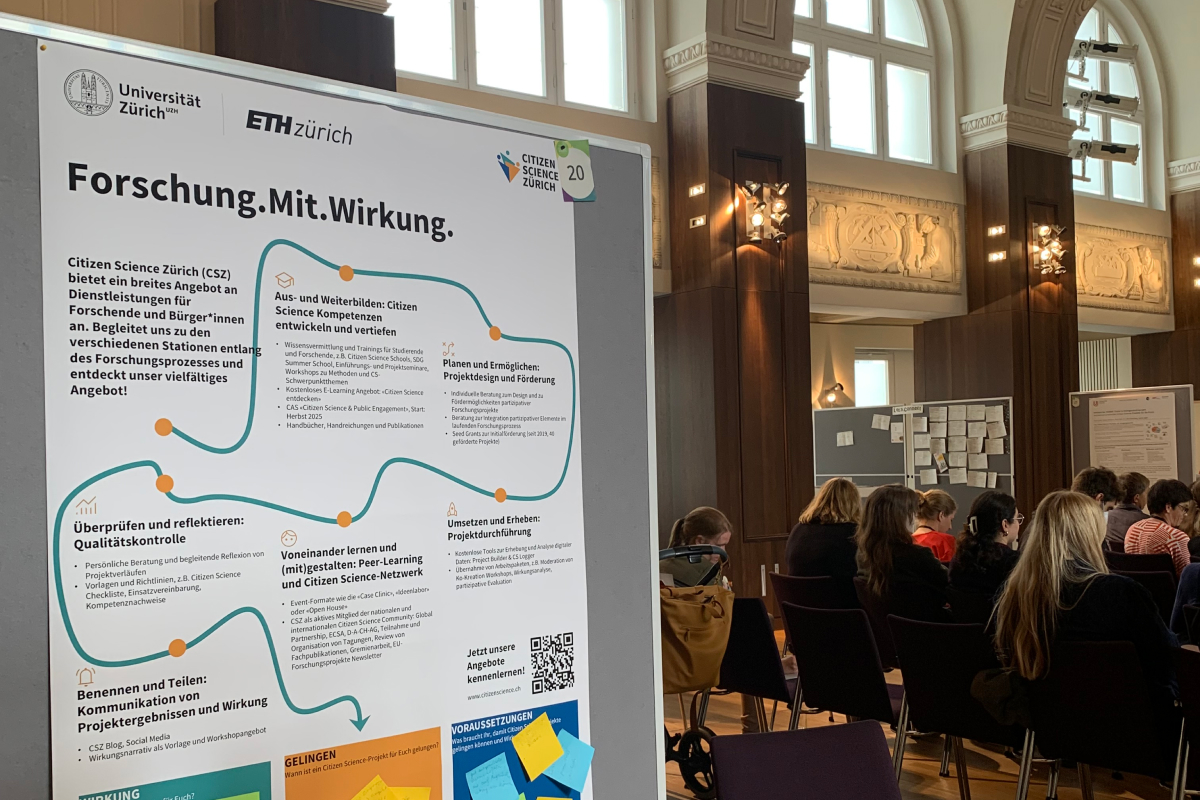CSZ at the Citizen Science Forum in Hamburg
This year's Forum Citizen Science was held under the motto "Mit:Wirkung" (With:Impact) and took place in mild temperatures and lots of sunshine in the golden fall in Hamburg. We were represented with two formats – a workshop and a poster – and provide a few insights into the two-day event in this article.
Authors: Melanie Brand, Alessandro Rearte
Photos: Melanie Brand
Keynote with a difference
The event kicked off with a classic conference format. However, the keynote was anything but classically academic in its focus and delivery – and thus visibly and tangibly won over the heterogeneous Citizen Science audience. The most striking aspect was right at the beginning: instead of one person, eight people stood on the stage and gave the presentation "Mit.Wirkung. Nachhaltige Forschungskooperationen aufbauen und Gesellschaft gestalten" together.
The speakers impressively demonstrated how the urban district laboratories in Bochum Hustadt and Hamburg Veddel lead to individual and collective change through local, long-term cooperation between academic and non-academic actors. New perspectives, recognition and activism create relationships, hope and concrete change on the ground. The presentation highlighted and explained three central levels of participatory project work: the epistemic, methodological and structural levels.
Epistemic level: knowledge through co-researchers
By working closely with local co-researchers, new knowledge is generated that goes beyond purely academic practice. Citizen Science enables a different approach to people in the neighborhoods and opens up a multi-perspective understanding. This leads to new questions being raised and existing assumptions being questioned. It is particularly important to critically examine the extent to which the research is actually useful for the people in the neighborhood. In this way, marginalized perspectives are given a voice and the relevance of research is viewed from a new angle.
Methodological level: new ways of producing knowledge
Participatory research approaches question traditional academic methods and methodologies of knowledge production and encourage the testing of modified or new formats. In the urban district laboratories, innovative formats such as the "open living room" were developed, in which sofas were set up on site in residential areas to invite people to personal discussions about their living situation. Such approaches are unconventional and pose challenges for scientific practice – for example, when it comes to conducting audio recordings or obtaining informed consent to participate in research.
Structural and institutional level: overcoming barriers
Participatory research also challenges institutional structures, critically questions them and looks for openings. The speakers pointed out that there is a need for new mid-level positions, especially for district research, as well as funding to support this important work. At the same time, research and teaching must be made more accessible – district researchers should be able to actively participate at universities. The project was able to achieve this and overcome existing barriers so that citizen scientists can offer their own courses at universities.
Conclusion: social change through Citizen Science
The urban district laboratories in Bochum Hustadt and Hamburg Veddel illustrate the potential of Citizen Science to bring about lasting change in social structures. As Deleuze and Guattari describe it with their rhizome metaphor, multidimensional shoots can emerge from these projects, leading to more democracy and social justice. Projects such as EMPOWER, in which interviews were conducted in the participants' first languages, also show that the willingness to embrace uncertainty is the key to social change.
Workshop
One year after we created the template for impact narratives, the Citizen Science Forum provided the perfect opportunity to test the finished product. Under the title "Wirkung überzeugend sichtbarmachen – Schritt für Schritt!", we offered participants a workshop that not only introduced them to the use of the template, but also helped to raise awareness of effective communication of impact in general. This was confirmed by the positive feedback from participants. They reported how the template not only helps as a support when writing a target group-specific text, but also provides valuable food for thought on the topic of project impact: what information is needed to communicate project impact? What information is already available and what information may need to be collected through an evaluation? One participant commented that the template could also provide inspiration when writing a project proposal. We are delighted with the wide range of feedback and will take this into account when considering the design of future offers.
Poster
We were also represented at the forum with the interactive poster "Forschung.Mit.Wirkung", on which we presented the services offered by Citizen Science Zurich along the research process and invited participants to share their perspectives on the topic of project impact and conditions for success. We had many interesting conversations and met people from different contexts who were interested in setting up institutional Citizen Science structures in the university environment or in training and further education programs.
We would like to thank Mit:forschen! and the University of Hamburg for the organization and look forward to participating again next year!
Do you have questions or suggestions on the topic of impact and participation? Get in touch with us and we'll think about it together!
